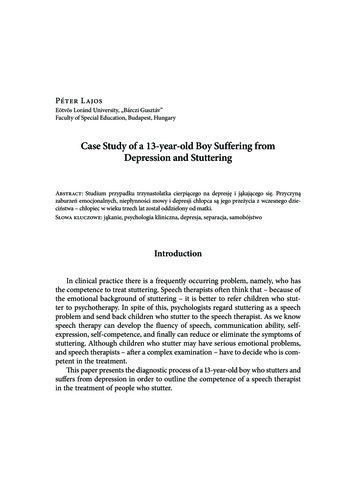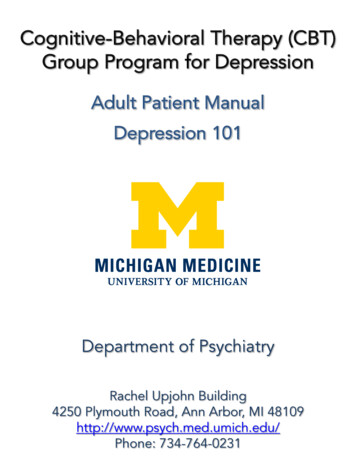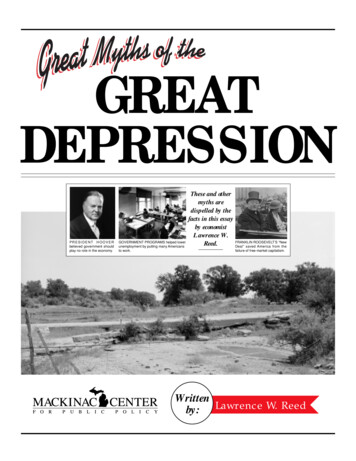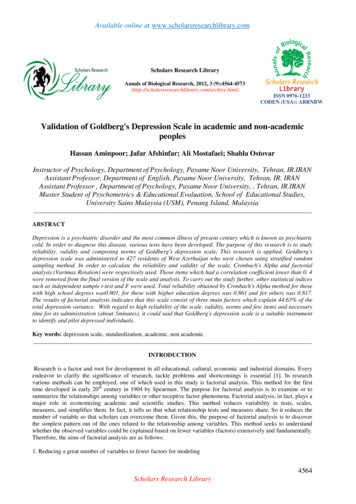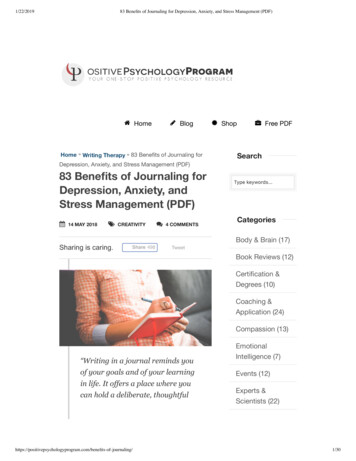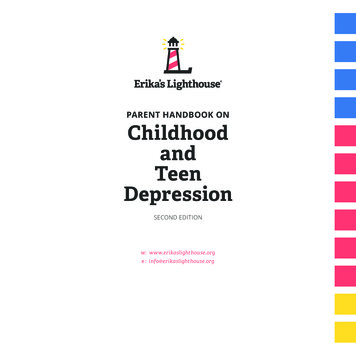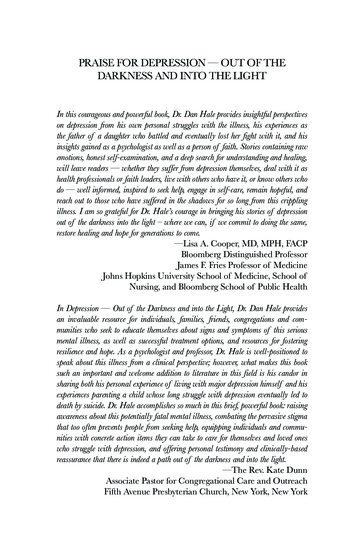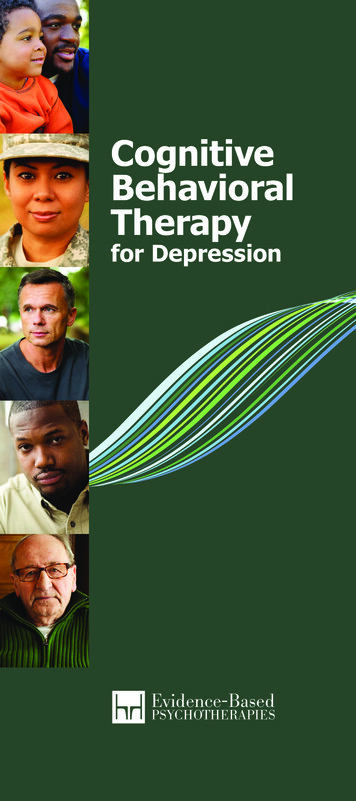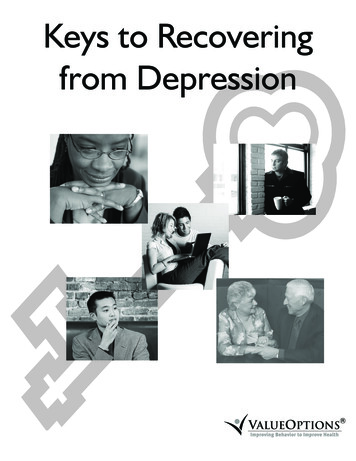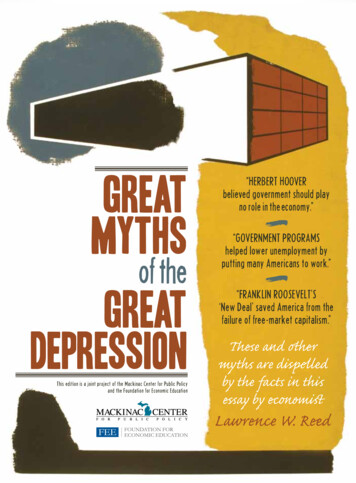
Transcription
DWD
Dealing With DepressionAntidepressant Skills for Teens
Dan Bilsker PhD(Lead Author)Dan is a clinicalpsychologist who worksat Vancouver GeneralHospital and consultsto a mental healthresearch group at theUniversity of BritishColumbia.Merv Gilbert PhDMerv is a clinicalpsychologist workingat British Columbia’sChildren’s Hospitaland in private practicein Vancouver.David Worling PhDDavid is a clinicalpsychologist workingin private practice inVancouver.E. Jane GarlandM.D., F.R.C.P.(C)Jane is a psychiatristwith a Mood/AnxietyDisorders Clinic whodoes research atthe University ofBritish Columbia onthe treatment ofmood problems.Dealing with Depression is based on the experience of the authors and on scientificresearch about which strategies work best in overcoming depression. Also, because strategies usefulfor adults may not be useful for adolescents, depressed and non-depressed teens helped in thedevelopment of this guide.Dealing with Depression is intended for:LLLteens with depressed moodconcerned adults who want to help a depressed teenother teens who want to help a friend or family memberThis book is meant to provide teens with accurate information about depression. It is not a psychological or medicaltreatment, and is not a replacement for treatment where this is needed. If expert assistance or treatment is needed,the services of a competent professional should be sought.Funding for this guide is provided by the Mental Health Evaluation & Community Consultation Unit (MHECCU) of The University of BritishColumbia through a grant by the Ministry of Children and Family Development, as part of the provincial Child and Youth Mental Health Plan.
InsideAbout Dealing With Depression1What is depression?Figuring out if you’re depressed or just sad2What causes depression?The truth about stress, gloomy thinking and depression5What can you do about depression?Getting help, talking to friends, learning skills, taking pills 10Antidepressant skillsTo help prevent or recover from depression14Realistic thinkingThinking fairly about yourself15Problem solvingHandling difficult situations28Goal settingSetting goals you’re going to reach39Useful stuffReasons to change48Drugs, alcohol and depression51Diet, exercise and depression53Dealing with relapse55Worksheets57
TOCAbout DealingWith DepressionDepression is an extreme low mood that lasts a long time and makes a person feel sad,irritable or empty. Many people, including many teens, have suffered in this way. Adepressed person: has much less energy to do activities feels like nothing matters. sees life in a negative way. feels like it will never get betterBGive yourself time and be patient; you canreturn to sections or ideas at any time. If youare reading this on a computer, save a copy forlater. Print any sections that you may want totake with you. If you have a printed copy, keepit somewhere private so you can read it on yourown time.ut depressed people do get better anddepression does end. There are effectivetreatments and self-help skills to dealwith depression. Health care professionals givedepression treatments, but you can learn selfhelp skills and apply them to your own life. Thisguide teaches a set of antidepressant skills youcan use to overcome depression. Sometimes theskills can be used on their own, when the depression isn’t too severe. Sometimes they have to beused along with treatments by professionals.We’ve suggested things to do, write down orthink about. Try to think of situations or examples that make the most sense for you. If thereare ideas that don’t make sense or that you arenot sure about, check with someone you trust.It will be easier to learn the skills if you writethe exercises in each skill section. You can writein the boxes we provide, in your own notebookor in a computer document. If you’re nervousabout other people reading what you’ve written,keep it private but remember:Dealing with Depression is meant for teens whohave been coping with depressed mood. Someof the things in this guide will make more senseto younger teens and some will make moresense to older ones. But check it out for yourself.Decide which parts of this guide make sense foryour life. You might start by skimming it andreading the stuff that is most interesting to you.Take a look at the Table of Contents to get anidea of what it’s about. When you are doneskimming you can go back to the start and workthrough each section at your own pace. Thereare no right or wrong answers and no tests!If you ever get thoughtsof harming yourself, tellsomeone who can help.1
TOCWhat is Depression?Depression is not . . .If you feel especially sad or irritable because ofthis situation, sleeping poorly, not wanting tosee your friends, not much appetite or too mucheating, then you’re probably experiencing lowmood. Low mood will typically go away in aweek or two, especially if there’s an improvement in the situation that started it.Most times when you feel down, you’re notdepressed. Feeling sad or low is a big part of lifeand can’t be avoided. When something goeswrong in your life, whether it’s an argumentwith a friend, a bad mark on a test, or a fightwith your parents, your mood might drop.Depression is . . .But suppose it doesn’t go away and just gets worse.You might be depressed . . . feeling that you are alwaysrestless or slowed-down; thinking that you areworthless or guilty; feeling really tired most ofthe time; feeling numb or empty; having a lot of troubleconcentrating or makingdecisions; thinking about deathor suicide.L if you feel very low mood oralmost no interest in your life,every day, and this feelingcontinues for at least twoweeks; ANDL if you have otherproblems like: big changes in weight orappetite; not being able to sleepenough or sleeping too much;MYTH: It’s normal for teenagers to be moody: teens don’t suffer from"real" depression.FACT: Depression is more than just being moody. And it can affectpeople at any age, including /teens.htm2
TOCWhat is Depression?The two most common types of depression are calledmild depression and major depression.Edepression by talking to a health professional(family doctor, psychiatrist, psychologist, clinicalsocial worker, mental health counsellor, ormental health nurse). Or you can visit yourlocal mental health centre.ach of these includes the same kinds ofproblems (the ones we’ve listed above)but major depression is more severe.Usually, when a teen gets depressed, it’s themild kind. You can check whether you have aFeeling OkLow MoodFeeling sad becausesomething happened.Mild DepressionThe sadness goes on toolong. Very hard to getout of the low mood.Major DepressionMisery, Despair, it goeson and on. Feelingnumb or empty.3
TOCWhat is Depression?If you think you have depression . . .doctor, psychiatrist, psychologist, clinical socialworker, mental health counsellor, or mentalhealth nurse. They can help you with a numberof different treatments for depression. A goodthing about most of these treatments is thatthey work well alongside those you learn fromthis guide.If you think you have depression, it is importantthat you find support. The skills in this guide aremeant to help you with your depression, but youshouldn’t have to do it alone. Talking it overwith someone you trust can help you understandyour problems or put them in perspective. If youcontinue to feel depressed, seek the help of ahealthcare professional. This can be a familyIf you feel like hurting yourself . . .a health care professional to help you getpast these feelings. If you can’t wait for anappointment, there are a number of crisis lines,staffed 24/7, that you should call. Just go toyour yellow pages and look under Crisis Centresto find the numbers in your area. Remember,things can get better.For many people, depression makes life seemhopeless and unmanageable. Most depressedpeople feel this way from time to time. For asmall number of individuals this feeling ofhopelessness gets so strong they begin to thinkthat life itself is not worth living. If this happensto you or someone you know, it’s time to gethelp. Talk to an adult you trust so you can findMYTH: Talking about depression only makes it worse.FACT: Talking about your feelings to someone who can help, like a physician,counsellor or psychologist, is the first step towards beating depression.Talking to a close friend can also provide you with the support andencouragement you need to talk to your parents or school n/teens.htm4
TOCWhat Causes Depression?Deach other. The way you act changes yoursituation, the way you think about yourselfchanges your feelings, the way you feel changesyour physical state, and so on. So we canthink of these five parts as part of a circleof depression.epression is not simple. Researchershave identified five different parts ofyour life that can cause depression orkeep it going. These parts are: your situation,your thoughts, your emotions, your physicalstate and your actions. These five parts all affectSituation loss of relationship loneliness arguing and conflictThoughts negative thinking habits unfair self-criticismActions withdrawal from others reduced activity poor self-careEmotions sadness despair emptiness anxietyPhysical state poor sleep low energy appetite changes nervous system changes Let’s take a closer look at these 5 parts.5
TOCWhat Causes Depression?SituationDepression often starts out with difficult andstressful situations — things like losing a friendshipor doing poorly in school. If your attempts tohandle the situation don’t work out, you canstart to feel overwhelmed and hopeless.Then you might get depressed.Some situations that increasethe chance of a depression:999loss of a relationshipThis might be:the death of someone you care for; losinga good friend; or breaking up with someone.conflict with another personThis might be:constant arguing with your parents; having a disagreement with a friend that youcan’t work out; being bullied; or getting in trouble often with a particular teacher.lonelinessThis might happen because:you are a shy person; your family moved; or you haven’t yet found others with the same interests.poor school performanceThis might happen because:you’re feeling down and having trouble concentrating; you have a learning disability; or the work is justreally hard for you. Sometimes, using alcohol or drugs causes teens to have trouble with schoolwork.smoothly: depression just seems to come out ofnowhere! Antidepressant skills are just as usefulfor these people, helping them to recover.That doesn’t mean people only get depressedwhen things are going badly. Some people getdepressed when their life has been going6
TOCWhat Causes Depression?Thoughtstheir thinking is slanted toward a negativeway of looking at things. This kind of thinkingexaggerates how bad a situation is and ignorespositive events.Each of us has our own way of thinking aboutsituations and how we think has a big effecton how we feel. Depressed teens often thinkabout situations and about themselves in a waythat is negatively distorted. This means thatunrealistic negative thoughts about your situationSeeing only problems and ignoring good things. If a friend passes in the hallway with only a quick hello,you take this as proof that no one really likes you, while ignoring that someone else said hi and smiled.unfair negative thoughts about yourselfJudging yourself in a harsh way, setting really high standards for yourself, putting yourself down. Anyfailures you’ve had or mistakes you’ve made come to your mind clearly — but you exaggerate how badthe failure or mistake was. Not only that, you forget what you’ve accomplished or the good thingsyou’ve done. It seems to you like the positive things don’t really count.unrealistic thoughts about your futureExaggerating the chance that bad things will happen, imagining the worst, looking at the future in agloomy way that doesn’t really make sense. For example, someone with depressive thinking who doesn’tmake a hockey team might imagine that he won’t get picked in the future and will never be able toplay league hockey.99999A person with depressive thinkingcan become discouraged or hopelesseven when things are going well7
TOCWhat Causes Depression?EmotionsRemember that depressed people thinkabout their situation and themselves in anunrealistically negative way. Since theiremotions are based on this distorted wayof thinking, then their emotions can also beunrealistically negative. It may be hard tothink of emotions as unrealistic. But imaginea man who thinks that airplane travel is verydangerous, who believes that airplanes areconstantly falling out of the sky. He will bevery frightened when flying; but his fearcomes from unrealistic thinking and so itis not realistic.Depression usually begins with feelings ofdiscouragement or sadness. If it gets really bad,the depressed person can feel swallowed up byhopelessness. Many depressed people feel likethey no longer get enjoyment from things theyused to love doing. If depression gets extreme,there might be a kind of numbness or emptiness,like having no feelings. It’s as though the painbecomes so strong that your mind simplyswitches off your emotions.Physical StateThe physical changes that go along withdepression make it harder to deal with problemsor even to learn the skills described in this guide.For some depressed teenagers, medication maybe helpful in restoring sleep, concentration andphysical energy, allowing them to learn and tryout the antidepressant skills.Depression often includes different kinds ofphysical problems. One of these is difficultywith sleep — a depressed person can’t fallasleep or sleeps too much. Beside sleepproblems, depressed teens often feel likethey have no energy, like they have no appetiteor like they’re always hungry. They can havedifficulty concentrating on schoolwork.Finally, some depressed teens develop a kindof “imbalance” in how their nervous systemoperates.Before reaching the age of 18, about one in five youngCanadians will experience an episode of major htmen/1 0 14.htm8
TOCWhat Causes Depression?ActionsPeople who are depressed often behave in ways that make depression worse.These include:withdrawing from family and friendsDepressed people feel like others don’t want to be with them or they don’t feel like being with others.So, they pull back from friends and family, turn down invitations and stop making efforts to connect.This leaves them cut off from other people.not taking care of yourselfWhen people are depressed, they feel like they don’t care about what they eat or how they take careof themselves. So, they often stop eating properly or exercising. They may abuse alcohol or drugs. Thismakes them feel physically weak and perhaps ashamed of their lack of willpower.not doing enjoyable activitiesDepressed teens might feel too tired or unmotivatedto stay involved with activities they used to findenjoyable. They might give up fun activities likesports, listening to music, reading or favouritehobbies. But inactivity can become a habit. Theless you join in fun activities, the less you feelable to enjoy them and the less youdo. Inactivity feeds depression.9
TOCWhat Can You DoAbout Depression?MILD DepressionLTalking to family and trusted friends abouthow you’ve been feeling is usually a goodthing to do. They can help you to figure outsolutions to some of the problems you’vebeen dealing with; besides, just knowingthat people care about you can be helpful.LWriting about problems you’re facing, yourfeelings and thoughts, and possible solutionscan help you to understand what you’regoing through and what choices you have.LSpeak to a health professional (family doctor,psychiatrist, psychologist, clinical socialworker, mental health counsellor, or mentalhealth nurse) if you think you might bedepressed. A professional can help youfigure out what’s been going on and canmake useful suggestions.L999In some cases, antidepressant medicationscan be helpful in overcoming milddepression. But for most adolescentswith mild depression, the answer doesnot lie in medication.99Learning and practicing the skills in thisguide, developing antidepressant skills, is likelyto be very helpful in overcoming mild depression.10
TOCWhat Can You Do About Depression?MAJOR DepressionLTalking to family and trusted friends abouthow you’ve been feeling is still helpful.LWriting about problems you’re facing, yourfeelings and thoughts, and possible solutionsis also still helpful.LLtherapy [CBT]. CBT is a talking therapy thatteaches new skills for thinking and actingmore effectively. This guide is based onCBT methods.Definitely see your family physicianif you think you might be depressed.Major depression is a serious problem andshould be diagnosed by a family physician,psychiatrist or psychologist. You might visityour local mental health centre, where thesemental health professionals are usuallyavailable.LAnother effective treatment is interpersonaltherapy [IPT], a talking therapy that teachesnew skills for dealing with friends, teachersand family.LAntidepressant medications are oftenhelpful in overcoming major depression inadolescents. But they don’t seem to be aseffective for adolescents as they are foradults: talk it over with your physician.One effective treatment for major depressionin adolescents is cognitive behavioural99999Learning and practicing the skills in thisguide, developing antidepressant skills, islikely to help in overcoming major depression.BUT remember that the skills taught in thisguide will not be enough by themselves to fixsomething this serious. If you have a majordepression, you should seek professional help.11
TOCWhat Can You Do About Depression?More About MEDICATIONproblems such as anxiety which might be helpedby medication. New research is telling us thatthe combination of medication and self-helpskills is better than medication alone. If you areprescribed a medication, ask your doctor aboutwhat to expect in terms of improvements andpotential side effects. Medication should beaccompanied by coping strategies as describedin this self-help guide, or other psychologicaltreatments.Antidepressant medications are helpful todepressed adults, but research has shown thatthey are not as effective in young people, oftenno more effective than a sugar pill or placebo.Medications need to be used with othertreatments and coping strategies.Up to half of teens diagnosed with depressionmay be prescribed medication by their doctors,especially if depression is more severe and goeson for a long time, or when they also have otherA recent scientific study compared cognitive-behaviour therapy,antidepressant medications and a combination of both of them witha control condition. The study concluded that the combination ofthe two was the most beneficial for moderate to seriouslydepressed teens.Journal of the American Medical Association, 2004, 292, No.712
TOCWhat Can You Do About Depression?Self-monitoringBeing able to accurately describe your moodis important if you want to look for changes.Most people work well with a simple moodline like this:Knowing how you’re feeling is one thing,but how do you describe it? Words like sad ordepressed can tell about a mood, but theydon’t really explain how upset you are. The worddepression is used a lot these days to meananything from “I’m really depressed about myparents’ divorce” to “I’m so depressed, theconcert sold out!”51(the saddest you’veever been) 10(the happiest you’veever been) Try putting your mood right nowsomewhere on this 1-10 line.As you work through this guide go backand check on your mood by givingit a number and keep track.13
TOCAntidepressant SkillsYou will learn three skills that can stop your moodfrom sliding down, can make you feel less depressed and canprevent depression from happening again.The skills are:Realistic Thinking Problem SolvingWe will explain how each of theseskills helps fight depression andshow you in a step-by-step wayhow to use the skill. It’s best to think aboutthese skills the way you would if you werelearning a new sport: practice is very important.Lots of people find it helpful to share this bookwith a trusted friend, counsellor or familymember — this person can help you to keeppracticing even when you feel low energy orunmotivated. She or he would be like a coachto keep you on target. If there’s no one likethat, then be your own coach and keepyourself practicing the antidepressant skills.As you work through the skills, it will graduallyget easier and the result is totally worth it. Goal SettingLThink more realistically and your emotionswill become less negative;LSolve problems more effectively and yoursituation will gradually improve and thiswill help your mood;LBecome more active, your mood will improveand it will become easier to think aboutyourself in a fair way.So by working with more than one skill at thesame time, you can make change in severalareas of your life, with each area having apositive impact on the others.Here’s something to remember. Just as the5 parts of your life (situation, thoughts, feelings,physical state and actions) can affect eachother in negative ways, they can also affecteach other in positive ways:If you never change your mind,why have one?Edward de Bono14
TOCRealistic ThinkingIn this sectionyou will learn to: Spot depressive thoughts that lead to depressed moodChallenge these depressive thoughtsCome up with realistic thoughtsPractice realistic thinkingRealistic thinking is:L accurate about your situation, seeingWe’ve talked about the kind ofnegatively distorted thinking thatfeeds into depression. Depressivethinking is unrealistic and unfair:Lunrealistic negative thoughts aboutyour situationLunfair negative thoughts about yourselfLunrealistic negative thoughts aboutyour futurethings clearly as they are;Lfair about yourself, looking in a balancedway at the positive and negatives inyour life;Laccurate about your future, not exaggeratingbad outcomes.Your plan is to replacedepressive thinking withrealistic thinking. So, how do you change depressive thinking?See the following page for the steps . . .15
TOCRealistic Thinking1 Spot depressive thoughtsdHere are the most common types of depressive thinking:all or nothingYou see situations as totally one way or the other. If you don’t get an A on the exam, that means youbasically failed it. If you’re having trouble with Math, that means you’re never going to understand it. Ifyour friend just says hi quickly in passing, that means she doesn’t want to spend time with you ever again.One version of this is perfectionism, where you think that you have to be the best in the situation or itmeans that you failed. But the fact is that very few situations are completely one way or the other. Mostsituations fall somewhere in between. It’s more realistic to think about situations in shades of gray, notblack and white. Having difficulty with Math is a problem that will require getting assistance, not a totaldisaster. Your friend may be unhappy with you over something, so you’ll need to talk it over with her, butthat doesn’t mean she never wants to see you again. As for perfectionism, since nobody can reach thetop-level performance all the time (and be the smartest Science student, the most creative Art student,the most popular person in the school), set your expectations at a level that is challenging but notsuperhuman. Remember, if you set your standard for yourself at the top level, you may be settingyourself up for depression.overgeneralizingBased on one negative event, you expect that things will continue to go wrong; or based on one negativefact, you assume that everything else in the situation is negative. You do poorly on one exam, so youexpect to do poorly on all the exams coming up. You hear that one student is mad at you, so you assumethat all the students in your class are mad at you. But it’s more realistic to look for extra information todecide how things are rather than rely on one little fact. Doing poorly on one exam doesn’t mean youcan’t do well on later exams in that subject if you study more, or on exams in other subjects. Insteadof assuming that all the students are mad at you, check it out.labelingYou talk to yourself in a harsh way, calling yourself names like “loser”, or whatever the worst insults arefor you. You talk to yourself in a way that you would never talk to a friend or almost anyone. But this kindof self-labeling is unfair. All it really accomplishes is to make you feel discouraged and overwhelmed. Stopputting bad labels on yourself and instead encourage yourself to try things and praise yourself for whatyou achieve. You’ll feel better and accomplish more.16
TOCRealistic ThinkingexaggeratingYou exaggerate risk and expect the worst possible thing to happen. If you’re going to a party, you expectthat everybody will ignore you and you’ll have a horrible time. Or an exam is coming up and you’reconvinced that you’ll fail, no matter how much you study or how well you’ve done before. Or you don’tsign up for any activities like music or sports because you’re convinced that you’ll be useless at it andyou’ll be humiliated. But this kind of thinking exaggerates the likelihood of something horrible happening.It makes you feel much more discouraged than you need to be and it often will stop you from trying newthings you might enjoy.mind-readingYou imagine that other people are criticizing or rejecting you, even when you don’t have any real reasonto think that. When you do this, you’re acting as though you could read someone else’s mind. If you’reintroduced to a new girl who doesn’t say much, you immediately assume she doesn’t like you or want to talkto you. But it’s more realistic to check it out, to spend some time finding out what the other person reallythinks. She probably doesn’t feel about you as negatively as you imagine, maybe even feels positively aboutyou. You don’t really know until you check it out, and what you imagine is usually worse than the reality.17
TOCRealistic ThinkingfilteringYou only pay close attention to events that are disappointing or to critical comments from others.Negative events are given a lot of importance. When something positive happens, you ignore it. Whensomeone praises you, it makes you feel uncomfortable and you treat it as unimportant [“he was justtrying to make me feel better”]. But it’s more realistic to pay attention to both kinds of events; in fact,positive events or positive feedback are often more important, because they tell you what you’re doingright. Building on what you do right is a great strategy for making life better.Notice what you are thinking, what you’re telling yourself.Do you use one of these kinds of depressive thinking?If so, write a Depressive Thought you have.Based on the list above, what type ofdepressive thinking is it?318
TOCRealistic Thinking2 Notice how depressive thoughtsdchange your moodMyour mood dropped — what was going throughyour mind just then? Maybe you got home fromschool, sat down in your room to listen to a CDand suddenly just felt hopeless — what wereyou thinking about?ost of the time, you’re not aware ofthe negative things you’re tellingyourself. Thoughts change quickly,so you need to pay close attention to spotdepressive thoughts. Think about the last timeyou felt really down, irritable, or noticed thatWrite down any depressive thoughts that go alongwith your negative moods:319
TOCRealistic Thinkingpeople have a few kinds of depressive thoughtsrepeating in different situations. After a while,you’ll begin to recognize the patterns and startto catch depressive thoughts while you’re inthe situation. Remind yourself that it’s just adepressive thought, not reality!riting it down is really helpfulwhen you’re trying to understandhow you got depressed. Seeingyour thoughts on paper makes it easier to lookat them clearly. A depressive thought thatseems to make sense in your head [“my frienddidn’t show up for lunch, she must hate menow”] is much less certain when you see itwritten down.WAlso – don’t criticize yourself for having depressivethoughts. Either your past experience taught youto think like this or being depressed made youthink like this — either way, it’s not your fault.Keep on writing your depressive thoughts andnoticing how these thoughts change your mood.You’ll probably find the same sorts of depressivethoughts again and again. Most depressed 20 It’s about change,not blame
TOCRealistic Thinking3 Challenge these depressive thoughts anddreplace them with realistic onesChallenging depressive thoughts meansrethinking the situation where you feltso lousy. We use a special worksheetwith three columns: the first is named Situation,the second is named Depressive Thoughts andthe third is named Realistic Thoughts. Here’s anexample of a Realistic Thinking worksheet:SituationDepressive ThoughtsRealistic ThoughtsWhile I wasI figured they were letting meK I’ve been friends with thesetalking to aknow they don’t want to hangtwo for a couple of years,couple of friendsout with me anymorethey still act friendlyin the cafeteriayesterday, I found[Overgeneralizing]out they hadgone out forK we’re planning to go outtogether on the weekendK maybe they were outcoffee the daytalking about the schoolbefore withoutproject they’re doinginviting metogetherK it looks like they still aremy friendsthinking you were using and write this down inthe Depressive Thoughts column. (For example,“Overgeneralizing”.) Finally, you try to come upwith more realistic ways of thinking about thesituation and write these in the last column.To do this worksheet you start by briefly describinga situation where you felt your mood drop (duringthe situation or afterwards). Then,
About Dealing With Depression B ut depressed people do get better and depression does end.There are effective treatments and self-help skills to deal with depression. Health care professionals give
